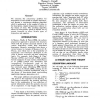166 search results - page 4 / 34 » Resultants of partially composed polynomials |
IWPEC
2010
Springer
13 years 5 months ago
2010
Springer
Abstract. Inclusion/exclusion branching is a way to branch on requirements imposed on problems, in contrast to the classical branching on parts of the solution. The technique turne...
FFA
2010
13 years 4 months ago
2010
Various results on parity of the number of irreducible factors of given polynomials over finite fields have been obtained in the recent literature. Those are mainly based on Swan&...
CEC
2008
IEEE
14 years 1 months ago
2008
IEEE
—In this paper, we proposed a reduced polynomial neural swarm net (RPNSN) for the task of classification. Classification task is one of the most studied tasks of data mining. In ...
ACL
1994
13 years 8 months ago
1994
1 We examine the consistency problem for descriptions of trees based on remote dominance, and present a consistency-checking algorithm which is polynomial in the number of nodes in...
CORR
2010
Springer
13 years 6 months ago
2010
Springer
A protocol for computing a functionality is secure if an adversary in this protocol cannot cause more harm than in an ideal computation where parties give their inputs to a truste...

